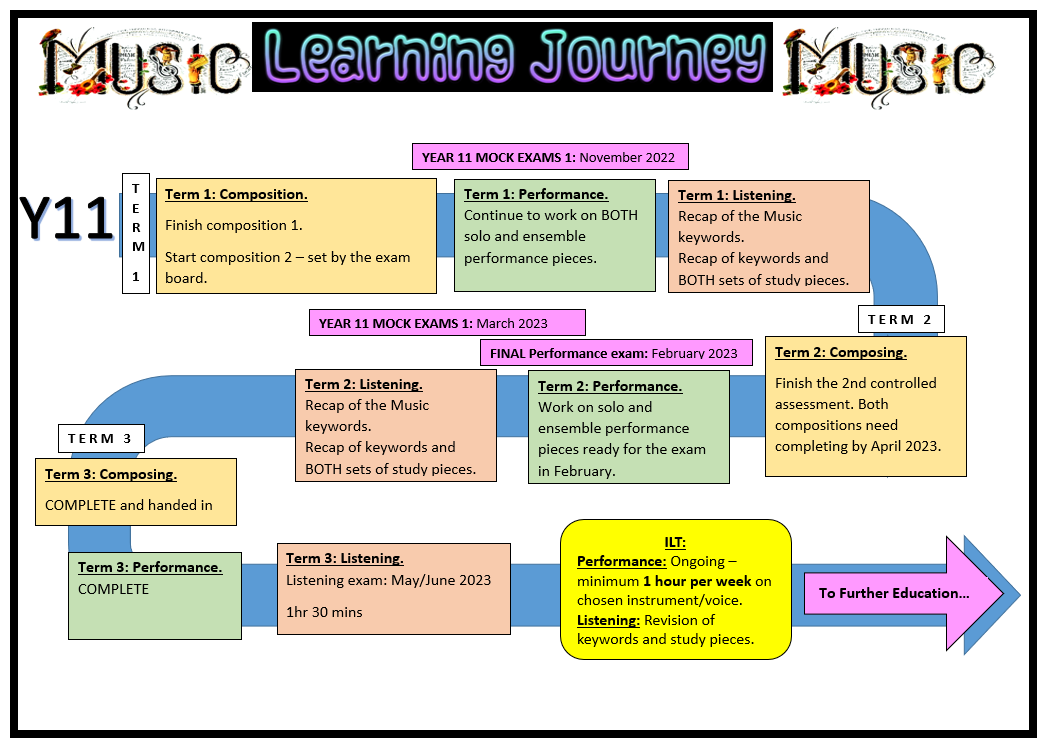Music
Why do we study Music?
Music is meaningful, engaging, inspiring and personal. Engaging with music should increase self-confidence, creativity and sense of achievement.
Music plays a huge role within everyday society. It can have many different functions; it can be entertaining, tell a story, be exciting, or be a form of relaxation or escapism. It can affect our moods and can bring back memories. It can reduce stress, lessen anxiety, improve moods and improve our memory.
Music at Hurworth School provides students with the opportunity to:
- Listen to a range of musical styles, genres and cultures
- Learn to describe music and be able to form critical opinions about the music they hear
- Learn to compose and perform in a variety of musical styles
- Understand the basics of music theory and how to read music notation
- Evaluate and review their own work and that of others
- Develop instrumental and vocal skills
- Participate in a wide range of enrichment activities
Year 7
Learning Outcomes
Students will be introduced to the elements of music and will develop their knowledge and understanding of how they are used, through composing, performing and appraising.
Students will learn how to read music both rhythm notation and treble clef notes. Students will work individually and in small groups to listen to, appraise, compose and perform music.
Topics Taught
Topic 1 BASELINE ASSESSMENT
- (approx. 6 weeks)
- Assessment of student’s current knowledge of music, aural awareness and basic composition and performance skills.
Topic 2 INSTRUMENTS AND ELEMENTS
- (approx. 12 weeks)
- Learning about the different families of instruments in the orchestra.
- Learning new musical vocabulary which will be used throughout each topic.
Topic 3 FEEL THE BEAT
- (approx. 12 weeks)
- Learning about rhythm and being able to read rhythm from staff notation.
- Composing and performing a rhythm piece in small groups.
Topic 4 MUSICAL ABCs
- (approx. 8 weeks: to continue into Y8)
- Learning about staff notation and learning the notes that use the treble clef.
- Learning about the notes on the keyboard.
- Performing from staff notation on the keyboards.
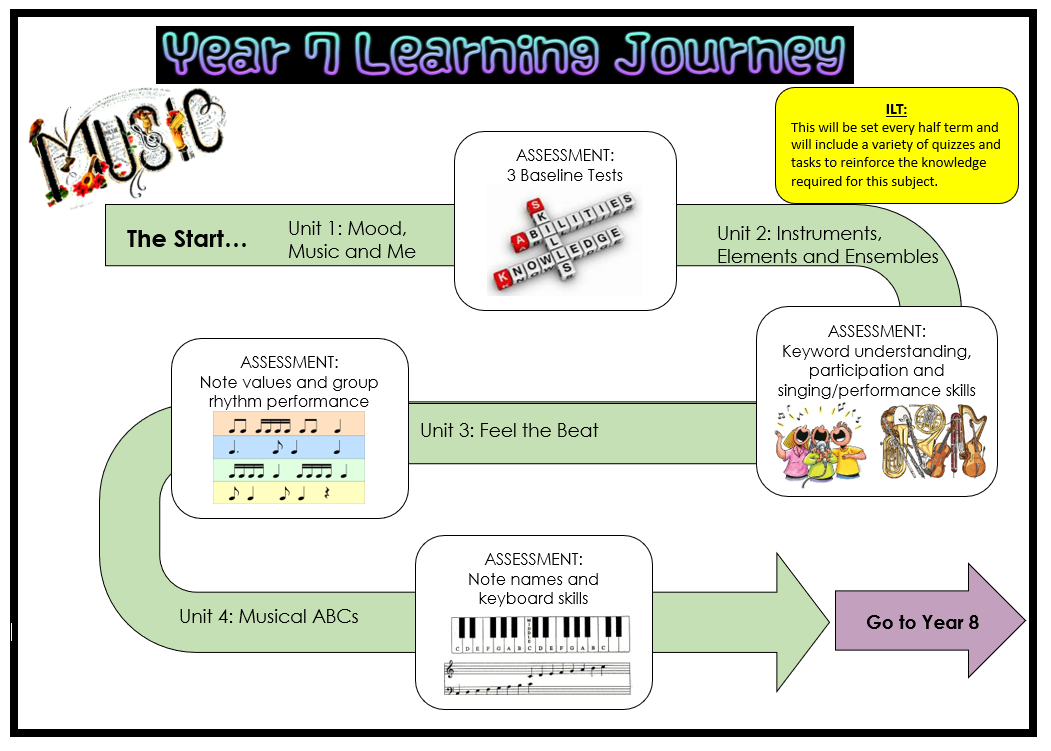
Music Watch, Listen and Read List
Year 8
Learning Outcomes
Students will consolidate their notation skills and further develop their keyboard skills.
Students will revisit the topic of rhythm from Y7 and will analyse what makes a good performance. This will be used to produce a group performance in the style of ‘Stomp’.
Students will study music from a variety of composers to develop appraisal and analytical skills using the elements of music. They will compose their own music to describe a chosen theme.
Topics Taught
Topic 1 MUSICAL ABCs –continued from Y7
- (approx. 12 weeks)
- Recap of staff notation and keyboard notes.
- Introduction to chords in the bass clef.
- Performing from staff notation on the keyboards.
Topic 2 STOMP
- (approx. 10-12 weeks)
- Recap of rhythms and note values.
- Analysis of what makes a good performance.
- Composition and performance of their own rhythm piece, drawing on features of the rhythm group ‘Stomp’.
Topic 3 PROGRAMME MUSIC
- (approx. 12 -14 weeks)
- Understanding the concept of programme music looking at examples composed by various composers.
- Performing a variety of pieces of programme music.
- Composing a superhero theme tune.
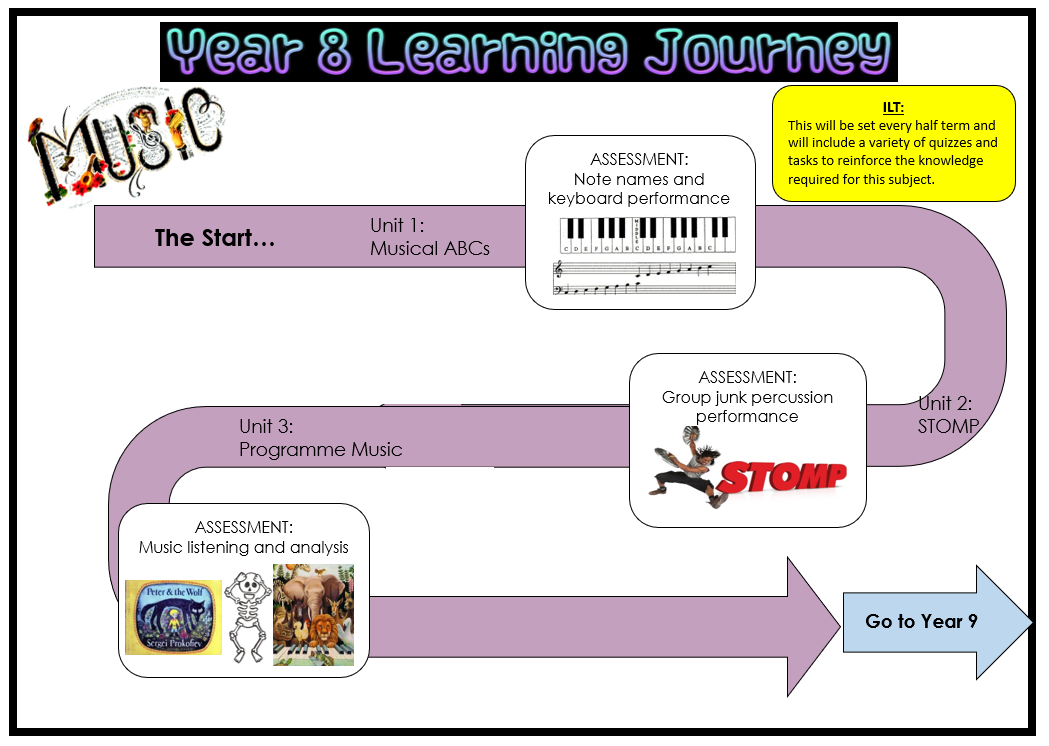
Music Watch, Listen and Read List
Year 9
Learning Outcomes
Students will further consolidate their notation skills and develop more advanced keyboard skills.
Students will study film music from a variety of composers to develop appraisal and analytical skills using the elements of music. They will be required to understand how the elements can alter the effect of the music.
Students will look at the features of music African music and will use this to compose and perform a piece of music using the Djembe drums.
Students will work on a project which focusses on music from 1950s to the current day, looking at the impact of music technology and the range of styles within each decade.
Topics Taught
Topic 1 Film Music
- (approx. 12 weeks – continued from Y8 Programme music)
- Learning techniques used by film composers to create different effects.
- Compose and perform a variety of film music from a range of genres.
Topic 2 AFRICAN MUSIC – melody
- (approx. 8 weeks)
- Learning the culture and characteristic musical features of African music, including the instruments.
- Compose and perform a piece of African music using the pentatonic scale, to demonstrate specific features.
Topic 3 AFRICAN MUSIC – drumming
- (approx. 8 weeks)
- Learning the culture and characteristic musical features of African music, including the instruments.
- Compose and perform a piece of African music using a variety of performance techniques on Djembe drums.
Topic 3 POP MUSIC FROM 1950-PRESENT DAY
- (approx. 12-14 weeks)
- Looking at the musical features from 1950 to present day.
- Learning about the variety of styles of popular music and how music has developed over time.
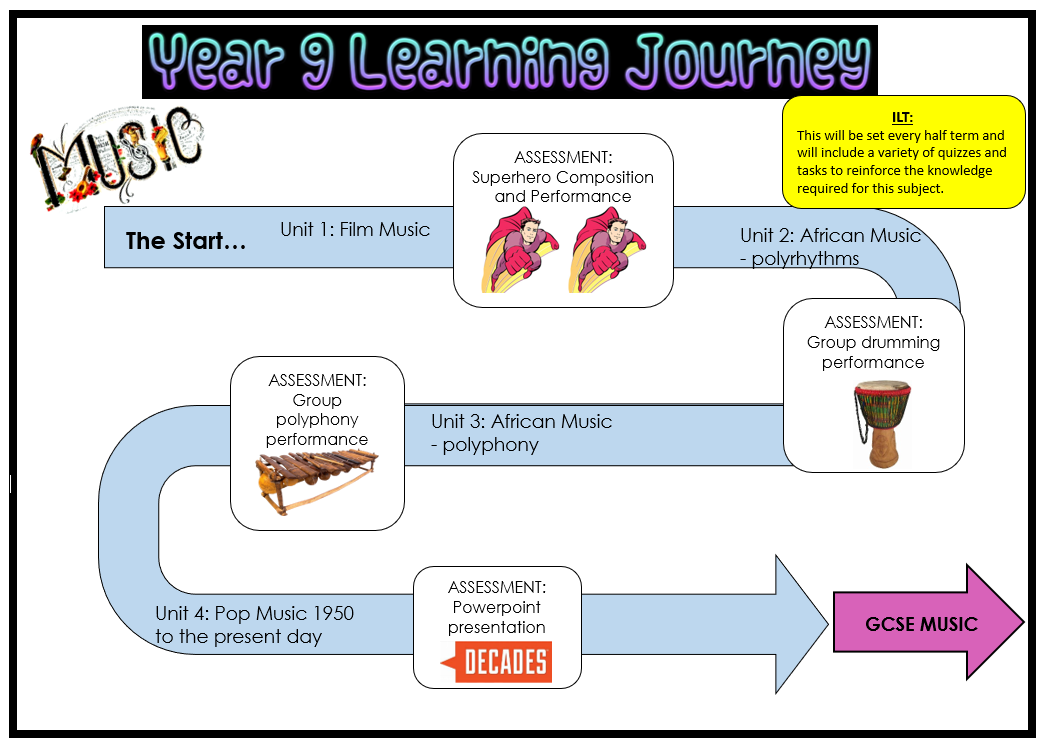
Music Watch, Listen and Read List
Year 10
Exam Specification
GCSE Music
AQA Specification
Study pieces for exam in both 2020 and 2021 are:
i) Study Piece 1: Mozart’s ‘Clarinet Concerto in A major – 3rd movement’
ii) The Beatles: ‘Little Help from my Friends’, ‘Lucy in the Sky with Diamonds’, ‘Within You, Without You’.
Learning Outcomes
Students will develop their knowledge and understanding of music theory, building the skills needed for creative and stylish composition work. They will learn how to use the music software Sibelius.
They will develop their independent practice skills to prepare for solo and ensemble performances on their chosen instrument/voice.
Students will begin to focus on the keywords and study pieces required for the listening and appraising paper.
Topics Taught
Term 1
- Learning the basics of composition: notation, chord sequences, melody writing, adding harmony.
- Familiarisation with Sibelius software and how to use it.
- Begin work on composition 1 – controlled assessment.
- Find and work on either a solo or ensemble performance piece.
- Introduction to the keywords, expanding on the range of vocabulary from KS3.
- Introduction to Study Piece 1: Mozart’s ‘Clarinet Concerto in A major – 3rd movement’
Term 2
- Continue to work on composition 1 – controlled assessment.
- Continue on either a solo or ensemble performance.
- Recap and expand on keywords.
- Introduction to the 3 Study Pieces from ‘Little Shop of Horrors’.
Term 3
- Continue to work on composition 1 – controlled assessment.
- Find a suitable second performance.
- Continue to recap and expand on keywords.
- Recap of Study Piece 1: ‘Mozart’s ‘Clarinet Concerto’
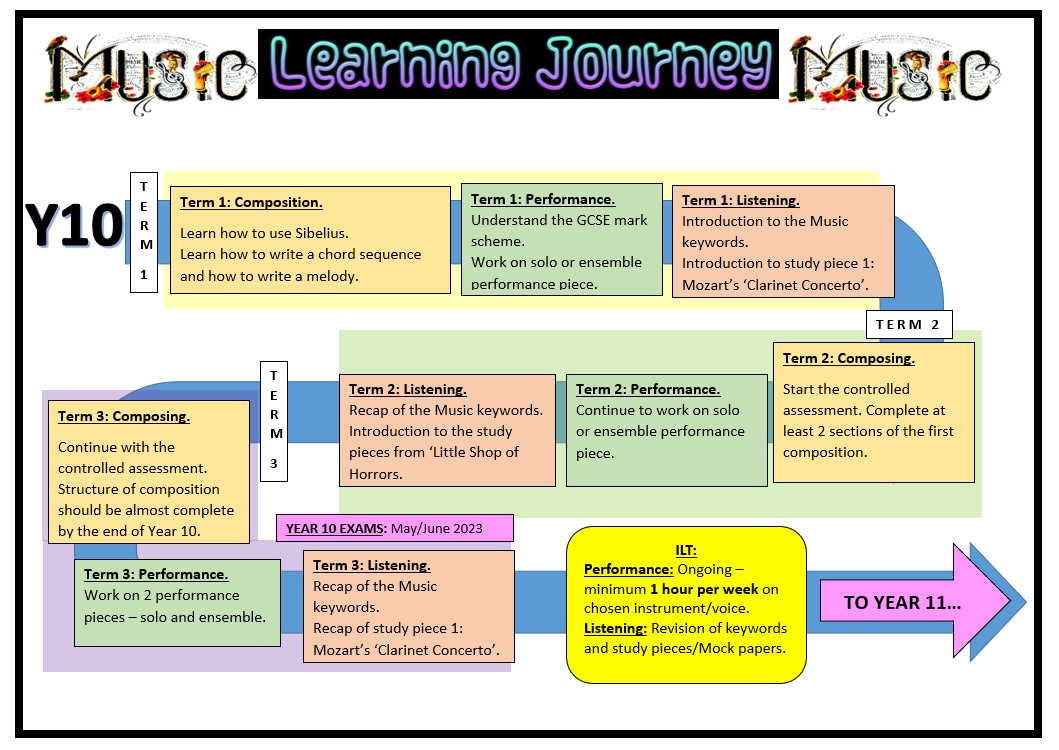
Music Watch, Listen and Read List
Year 11
Exam Specification
GCSE Music
AQA Specification
Study pieces for exam in both 2020 and 2021 are:
- Haydn’s ‘Clock Symphony’ – 2nd movement.
- The Beatles: ‘Little Help from my Friends’, ‘Lucy in the Sky with Diamonds’, ‘Within You, Without You’.
Learning Outcomes
Students will complete all aspects of their composing and performing controlled assessments. They will complete their analytical study of the final study pieces, and build and consolidate their knowledge and understanding of the vocabulary studied in Year 10.
Topics Taught
Term 1
- Finish composition 1 – controlled assessment.
- Start composition 2 based on brief set by the exam board.
- Continue to work on both performance pieces and prepare for exam.
- Continue to recap and expand on keywords.
- Recap of the 3 Study Pieces from “Little Shop of Horrors”
Term 2
- Continue to work on composition 2 based on brief set by the exam board. Deadline at the end of the term.
- Final Performance exam – February.
- Continue to recap and expand on keywords.
- Recap of both study pieces.
Term 3
- Continue to recap and expand on keywords.
- Recap of both study pieces.
- Final listening exam.
